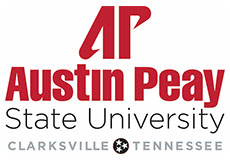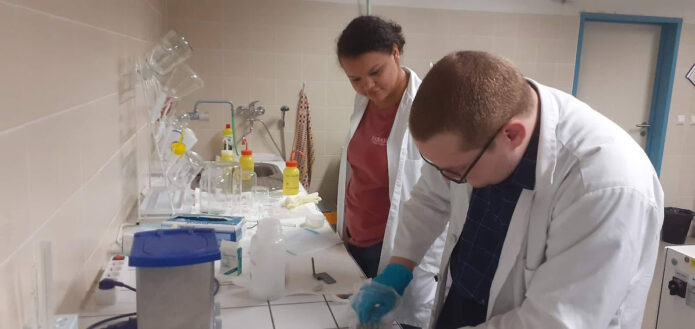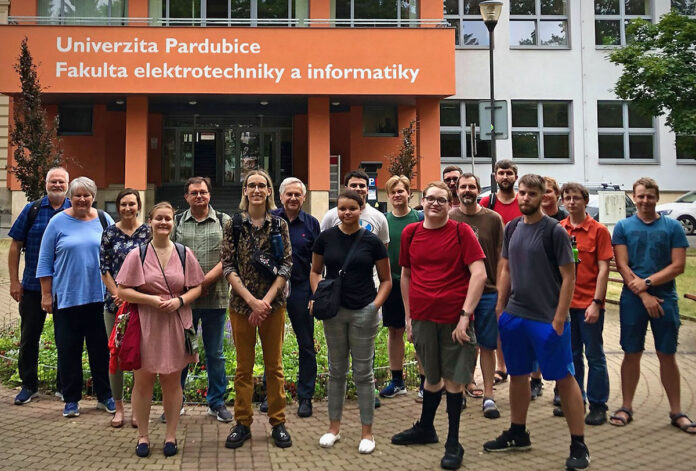 Clarksville, TN – Five undergraduate students from Austin Peay State University (APSU) spent seven weeks conducting research at three partner universities in Europe.
Clarksville, TN – Five undergraduate students from Austin Peay State University (APSU) spent seven weeks conducting research at three partner universities in Europe.
Their trips were part of a three-year, $300,000 International Research Experience for Students (IRES) grant from the National Science Foundation that will send 18 Austin Peay State University College of STEM students to universities in the Czech Republic, France, and Poland.
For many of the students, the experiences will be life-changing, he said.
‘Many firsts on this journey’

For chemistry senior Peyton Simpson, Kovalskiy’s words ring true.
“There were many firsts on this journey,” the Shelbyville, Tennessee, native said. “I had never taken a plane before, and I had never traveled abroad.”
Simpson attended the University of Pardubice in the Czech Republic.
“I frequently had the chance to push outside of my comfort zone, such as when I had to figure out how to use a transit bus or communicate with non-English speakers,” he added. “I had the opportunity to eat genuine Czech food.”
But the trip also opened research and educational opportunities. Simpson participated in research that compared the structure in thermally deposited and spin-coated nontoxic chalcogenide thin films.
“Working with instruments that are not available at Austin Peay State University was a privilege,” he said. “This experience really cemented my decision to pursue graduate studies. Since I enjoyed working in the lab and evaluating my data, I am clear that I want to continue down this path of research.”
‘More real for me”
Chemistry junior Destiny Mathews of Clarksville also attended the University of Pardubice in the Czech Republic and shared many of the experiences that Simpson had.
“Being able to work in a lab and be responsible for my own results solidified my desire to work in a lab-based career in the future,” she said. “My mentors in Pardubice were able to teach me specialized techniques in a short time and allowed me to rely on my own skills as a scientist in training while still guiding me throughout the research.”
The program allowed her to work in a prominent materials science lab but also allowed her to navigate the challenges of working in another country.
“Working in a completely foreign environment permitted me to become more confident in my communication skills,” Mathews said. “The ability to explore in my free time gave me the opportunity to learn about the history of the streets and buildings I passed through, making it more real for me.”
‘The great opportunities that APSU can provide’

Biology senior Michael Truax of Clarksville did research at the University of Rzeszow in Poland.
His research tried to deepen the understanding of spectra on blood and bone marrow for the diagnosis of leukemia and urine for Fabry’s disease and diabetes. He also worked on oxide glass synthesis, which introduced him to upper-level material sciences.
“This was an amazing opportunity that I would have never experienced if I didn’t just check my email one day,” he said. “I try and share with other students the great opportunities that APSU can provide you if you just go out there and look for them.”
This opportunity also introduced something new to Truax.
“I haven’t done actual laboratory research before that had a goal of publishing a paper or putting together data for further research, so that was new for me,” he said. “It was interesting to see the true slog of scientific experiments. It took a lot of time to set up and run these experiments, some taking close to an hour per sample.
“Also, with the work being physics-based, as a biology student it was a valuable learning experience to understand a different field of science that is able to be utilized in medicine,” he added.
More about the program
The three European universities participating in the program are the University of Rennes I in France, the University of Rzeszow in Poland and the University of Pardubice in the Czech Republic. Each university specializes in aspects of nano and glass technology.
Austin Peay State University students from the departments of physics, engineering and astronomy; chemistry; biology; and geosciences are participating in the program. Their research will advance understanding of the properties of amorphous materials at the nanoscale and how these properties can achieve advanced applications such as optical computing, photonics and bioglasses.
The other APSU students who participated this summer are Anna Sheets and Dakota Price, both engineering physics majors who attended the University of Rennes I in France.
Drs. Roman Holovchak and Justin Oelgoetz, both from the Department of Physics, Engineering and Astronomy, and Dr. Carrie Brennan from the Department of Chemistry joined Kovalskiy as co-primary investigators on the project. NSF also designated a team from APSU’s Eriksson Department of Education – Drs. Philip Short, Donna Short and John McConnell and Tasha Berry – to evaluate the program.
Austin Peay State University students are scheduled to travel to Europe in May and June over the next two summers before the grant ends in 2024.



